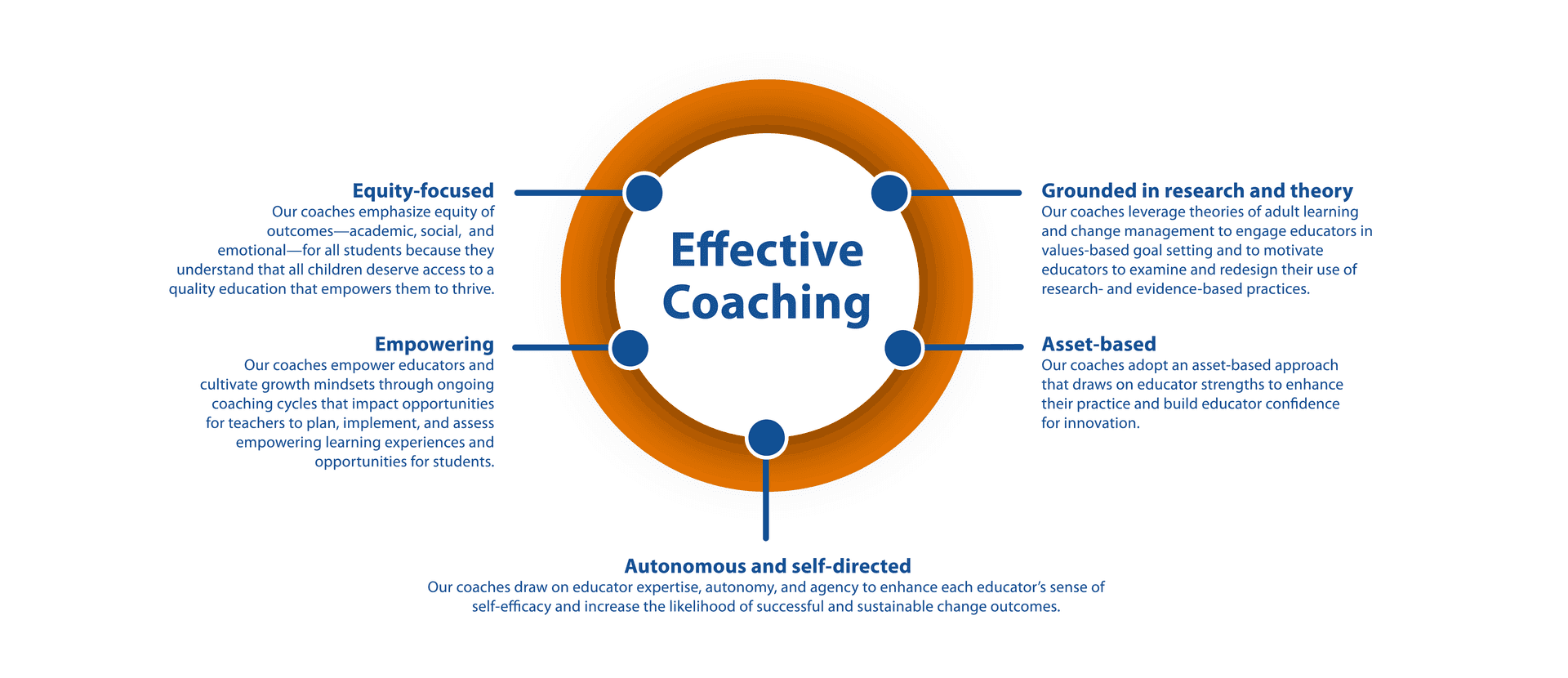RTI describes “coaching” as a partnership that relies on intentional conversation and purposeful design. Instructional coaching leverages an educator’s values, beliefs, thinking, and behaviors to cultivate reflection, agency, and empowerment (Bandura, 1997, 2001; Costa et. al., 2016; Knight, 2007; Short, 1992). Effective coaching requires an understanding of adult learning theory, change management theory, and theories of agency to guide educators through reflection and shared problem-solving while empowering them to enact their own solutions.
From the classroom to the boardroom, RTI coaches, all of whom are former educators, leverage a coaching approach to support data-driven decision-making, intentional implementation and follow-through, and critical reflection using an asset-driven and theory- and research-based approach. One of the features that differentiates RTI’s education supports is the use of job-embedded, integrated coaching at all levels of education systems, including instructional coaching, school and district leadership coaching, and executive-level coaching. The educator being coached is seen as the expert of his or her own context, goals, and learning opportunities. This approach builds a sense of competence and self-efficacy in educators, thereby preparing them to solve their own problems and take healthy risks. A coaching approach that empowers educators also impacts the students they teach.
Coaching increases the likelihood that educators will implement new practices in their classrooms, schools, and districts. While professional learning workshops introduce educators to new approaches and strategies, job-embedded instructional coaching stimulates the self-reflection and self-analysis needed to improve or refine instructional effectiveness (Veenman & Denessen, 2001).
RTI coaches:
- help educators identify relevant and meaningful goals by emphasizing alignment between their values and their work;
- support educators as they use data to critically examine their beliefs about teaching, learning, and leading;
- build educator capacity for thinking about and acting on instructional and other school- and district-based decisions, actions, and outcomes by using powerful questioning techniques that draw on educator experience and expertise; and
- share innovative and research-based practices and engage educators in planning for intentional implementation in their classrooms, schools, and districts.

RTI incorporates a variety of instructional rounds and learning walks to support coaching efforts. Instructional Rounds combine three common elements of improvement: classroom observation, an improvement strategy, and a network of educators. The primary purpose of Learning Walks is for the observing teachers to compare their instructional practices with those they observe.
In addition to RTI-facilitated coaching, RTI provides instructional coach development as a professional learning experience designed to develop local instructional coaches in schools and districts. The purpose of developing coaching skills is to enhance locally sustainable practices that support high-quality teaching and learning, purposeful coaching, and effective instructional rounds.
The follow graphic outlines hallmarks of effective coaching:

Project Examples
RTI partners with innovative schools, districts, states, and organizations to address education challenges. Here we highlight two of those partnerships.

Goose Creek CISD
Since 2019, RTI has supported teachers at the district’s career academies in a cohort-based model to foster a deep understanding of instructional practices focused on project-based learning. Career and technical education teachers have strengthened their professional capacity to create authentic learning opportunities for students as a result of job-embedded coaching support. Teachers have also deepened their implementation of PBL pedagogical practices across all content areas emphasizing cross-curricular planning practices by working with RTI coaches.

Brunswick County Public Schools
To align district-wide coaching practices and increase theory-based coaching strategies for better coaching outcomes, RTI worked with 20 instructional coaches in Brunswick County, North Carolina, to provide coach training. Training included 3 days of professional learning with two virtual one-on-one coaching sessions for each coach. Professional learning included theories of adult learning to engage and motivate teachers for change, collecting and using classroom data for coaching conversations, and using deductive questioning techniques to support teacher reflection. The coaching program emphasized foundational and advanced coaching practices that empowered teachers to set their own goals for growth and take ownership of building their own capacity.
Instructional Coaching Experts
Our Education Services team is led by former teachers, principals, administrators, policy experts, and strategists who have the practical experience to translate ideas into action.

Fredrica Nash
Director
Center for Education Services
Fredrica Nash began her path toward education when selected to participate in the prestigious N.C. Teaching Fellow program. She spent the early years of her...
Expert in Social and Emotional Learning
Expert in Instructional Coaching
India Walker
Education Consultant
Center for Education Services
India Walker is an education consultant at RTI and certified PMP with nearly two decades of experience in education. Her experience as a practitioner has...
Expert in Instructional Coaching
Expert in STEM Education
Resources
- Instructional Coaching One Pager
- The Coaching Wheel: Improving Educator Practice
- Coaching to Empower Teaching book flyer
- Empowering Students Starts with Empowering Teachers
- Coaching for Teacher Resilience during COVID-19 | Part 1: Burnout and Trauma
- Coaching for Teacher Resilience during COVID-19 | Part 2: The Power of Coaching
- Coaching for Teacher Resilience during COVID-19 | Part 3: Coaching for Resilience
- Coaching for Teacher Resilience during COVID-19 | Part 4: The Coaching Wheel
Questions?
Contact Education Services
at educationservices@rti.org